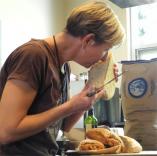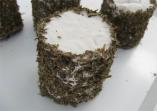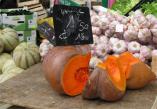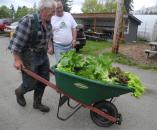Friday’s workshop on “Ensuring food diversity and safety in Europe” had some sponsorship from the EU’s Directorate-General for Health & Consumers. If I understood correctly, this was the first year that EU delegates came to join the discussions at Terra Madre, and they were well placed to respond to concerns – long publicised in the media and elsewhere – that EU regulations are out to destroy traditional foods in Europe.
Eric Poudelet was first up, talking about food safety. He cited a figure of about 4000 declared instances of “food intoxications” – estimating the total with undeclared instances could be more like 2 million (for the EU’s 500 million population). The EU’s response to the major food problems of the nineties (BSE, Belgium’s dioxin contamination, etc) was a white paper on food safety in 2000, which proposed some 80 food actions to assure “farm to table” safety, including traceability of feed and food, and risk control measures. (This led to the creation of the European Food Safety Authority, whose mandate includes food and feed safety, nutrition, animal health and welfare, plant protection and plant health.)
He denied that Brussels aims to kill of traditional food products, maintaining that they believe it’s possible to prepare traditional food products while respecting hygiene rules. Member states are responsible for developing and administering appropriate hygiene procedures in line with EU guidelines.
Poudelet said that the EU wanted to stimulate the use of raw milk, one of the most important ingredients of great food in Europe, and the guidelines were adaptable to this and other traditional methods and ingredients. So for example although stainless steel is preferable for mixing foods – including meats – wood or copper can be allowed if these are important to traditional methods of preparation. Protected designation of origin, which protects these exceptions, does not cover all varieties of foods, but it may be extended to cover products that are currently excluded. So that’s hopeful.
Academic Jean-Pierre Poulain, who teaches sociology and anthropology at the University of Toulouse, spoke next about the importance of traditional foods in European culture. He talked about urbanization, and the food traditions that have moved on and off the land with the people moving to cities; he noted that “peasants” are still few but vocal, and they should be heard as we work out how to feed the world.
He went on to discuss some of the shifts in the world of food; how it’s becoming more and more “medical”. Though it’s true we have more treatable medical conditions than ever before, we can view food as one of the factors in both cause and prevention. There are new challenges to improve the quality of our food as we grow older.
Food is also becoming more “legalized”: many laws and regulations try to govern traceability and safety, and lead to prosecutions. We may not all be victims taking our complaints to the courts, but the legal profession is getting actively involved (he gave the example of Erin Brockovich), and this further distances people from food.
Food is also “politicized” through protests against industrial food systems; the north/south divide and dialogue over access to food; climate change and carbon emissions; and the “buycott vs boycott” effect for marketing ethical, fair trade and local foods.
Food heritage is also on the table: in principle at least, the UN is willing to admit culinary traditions to its intangible heritage lists, which register for protection “practices, representations, and expressions, and knowledge and skills which are transmitted from generation to generation and which provide communities and groups with a sense of identity and continuity.” (Although food traditions that relate to the activities that have been approved for the list are often included, no culinary tradition on its own has yet been approved, as far as I’m aware, though France and Mexico have both tried and been rejected twice.)
Poulain ended with a brief analysis of the issues around animals, and the two poles of concern: anthropomorphism (Bambi syndrome) vs idealization of the natural, neither of which is helpful when addressing the full scale of the place of meat animals in a world struggling to feed itself equitably. What planet do we choose to leave to our children, he asked, and what fairness can be found between north-south and urban-rural divides?
One other speaker I’ll mention was Daniele Rossi, the project coordinator for Truefood which has 11 member organizations (Federalimentaire is the Italian one; there is no UK representation) representing some 35,000 small to medium European food and drink businesses. Because most research into food safety and technological innovation is done for large-scale enterprises, Truefood aims to find applicability for smaller ones, and to help them tap into food safety initiatives and technological innovations, as well as better understand consumer perceptions and improve marketing and supply chain development. In other words, it seemed to me, to make small companies act more like big ones. It left me wondering how helpful that really was when the economic might of the multinationals overhangs us all; might it not just prepare the small fish to be more easily digested by the large?
Small-scale traditional food production is a massive segment of the European economy: in Italy alone about two-thirds of the national sales turnover is in traditional foods. Europe-wide, some 300,000 small/medium sized producers, most family-owned, typically with fewer than 20 employees, account for 4.4 million jobs. When you consider the numbers, that’s a lot of clout, but it’s fragmented and dispersed throughout the continent; on the other side of the balance are the 30 large multinationals. And we know what their aims are.
There has been a lot of discussion this week about the skewed reality we’re living, where economics has overwhelmed humanity, and left us a more brutal world to live in. More on that in the next post.









